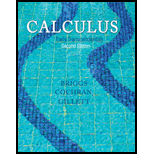
Concept explainers
Logistic equation for a population A community of hares on an island has a population of 50 when observations begin (at t = 0). The population is modeled by the initial value problem
- a. Find and graph the solution of the initial value problem, for t ≥ 0.
- b. What is the steady-state population?
Want to see the full answer?
Check out a sample textbook solution
Chapter D1 Solutions
Calculus: Early Transcendentals (2nd Edition)
Additional Math Textbook Solutions
College Algebra (7th Edition)
Algebra and Trigonometry (6th Edition)
Elementary Statistics: Picturing the World (7th Edition)
Basic Business Statistics, Student Value Edition
Elementary Statistics
Elementary Statistics (13th Edition)
- Forces of 9 pounds and 15 pounds act on each other with an angle of 72°. The magnitude of the resultant force The resultant force has an angle of pounds. * with the 9 pound force. The resultant force has an angle of with the 15 pound force. It is best to calculate each angle separately and check by seeing if they add to 72°.arrow_forward= Let (6,2,-5) and = (5,4, -6). Compute the following: บี.บี. บี. นี = 2 −4(u. v) = (-4). v= ū. (-40) (ū. v) v =arrow_forwardLet ā-6+4j- 1k and b = 7i8j+3k. Find a. b.arrow_forward
- Find the volume of the parallelepiped determined by the vectors a = (3, 5, −1), ☎ = (0, 3, 1), c = (2,4,1).arrow_forwardFind the area of a triangle PQR, where P = (-5,6, -1), Q = (1, -3, -2), and R = (-5, -1,4)arrow_forward17. [-/1 Points] DETAILS MY NOTES SESSCALCET2 6.2.050. Evaluate the integral. (Remember to use absolute values where appropriate. Use C for the constant of integration.) du 4√3- -4² Need Help? Read It SUBMIT ANSWER 18. [-/1 Points] DETAILS MY NOTES SESSCALCET2 6.2.051. Evaluate the integral. (Use C for the constant of integration.) - 49 dx x² +3 Need Help? Read It Watch It SUBMIT ANSWER 19. [-/1 Points] DETAILS MY NOTES SESSCALCET2 6.2.057. Evaluate the integral. (Remember to use absolute values where appropriate. Use C for the constant of integration.) 25+ x2 dxarrow_forward
- Let (5,3,-7) and = (2, -3, -6). = Compute the following: u× u = -4(u xv) ux (-4v) (+v) × v=arrow_forwardLet a = (4, -2, -7) and 6 = (2,5, 3). (ã − ò) × (ã + b) =arrow_forwardUse the graph of the function y = f (x) to find the value, if possible. f(x) 8 7 6 Q5 y 3 2 1 x -8 -7 -6 -5 -4 -3 -2 -1 1 2 3 4 5 6 7 8 -1 -2 -3 -4 -5 -6 -7 -8+ Olim f(z) x-1+ O Limit does not exist.arrow_forward
 Functions and Change: A Modeling Approach to Coll...AlgebraISBN:9781337111348Author:Bruce Crauder, Benny Evans, Alan NoellPublisher:Cengage LearningAlgebra & Trigonometry with Analytic GeometryAlgebraISBN:9781133382119Author:SwokowskiPublisher:Cengage
Functions and Change: A Modeling Approach to Coll...AlgebraISBN:9781337111348Author:Bruce Crauder, Benny Evans, Alan NoellPublisher:Cengage LearningAlgebra & Trigonometry with Analytic GeometryAlgebraISBN:9781133382119Author:SwokowskiPublisher:Cengage Glencoe Algebra 1, Student Edition, 9780079039897...AlgebraISBN:9780079039897Author:CarterPublisher:McGraw Hill
Glencoe Algebra 1, Student Edition, 9780079039897...AlgebraISBN:9780079039897Author:CarterPublisher:McGraw Hill

 Trigonometry (MindTap Course List)TrigonometryISBN:9781337278461Author:Ron LarsonPublisher:Cengage Learning
Trigonometry (MindTap Course List)TrigonometryISBN:9781337278461Author:Ron LarsonPublisher:Cengage Learning





